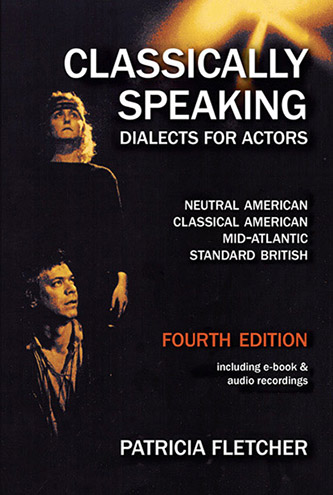
Fourth Edition, includes digital e-Book access
Availability: In Stock/Ready to Ship.
Suggested retail price shown above.
For discounted Bookstore or School District bulk orders: Contact Us
Classically Speaking: Dialects for Actors is meant for anyone interested in learning well-spoken Neutral American Speech (aka General American). It is also an effective tool for learning Classical American, Mid-Atlantic and Standard British dialects.
Each Neutral American vowel, diphthong and consonant sound is described, along with an accompanying audio track, and 'sound checks' of common difficulties. In addition, the International Phonetic Alphabet is covered and practice exercises are included, along with chapters on rhythm, stress, use of the weak and strong forms of words, linking sounds, inflection, pause, literary devices and scansion (for those interested in Shakespeare). Three monologues spoken by professional actors wrap-up the 325 page Neutral American Section. This is followed by Classical American (88 pages), Mid-Atlantic (16 pages) and Standard British dialects (62 pages), including accompanying exercises, audio selections for each adjustment covered, and three monologues spoken by professional actors for each of these dialects.
When you purchase the textbook you will receive a unique code for digital e-Book access (code found on the inside front cover). The e-Book provides downloadable audio selections which are accessible by simply clicking the e-Book reader app screen. Note: using digital e-Book requires downloading the (free) publisher's XanEdu app. Both the paperback book and the digital e-Book are offered together as a package and are included with your book purchase.
Introduction
Overview & International Phonetic Alphabet (IPA)
— Selections for Recording
— Consonant Overview
— Vowel Overview
— IPA Symbols Chart
— IPA Transcription Practice
— IPA Transcription Answer Key (without length)
— Length Guidelines
— IPA Transcription Answer Key (with length)
Neutral American Dialect
— Rhythm Highlighters
— — Summary
— — Linking — avoiding glottal attack and glottal fry
— — Key Words & Stressed Syllables
— — Noun/Verb Variations
— — Weak Forms
— — Inflection
— — Pause
— — Literary Devices
— — Scansion
— Front Vowels
— Mid Vowels
— Back Vowels
— Diphthongs
— Diphthongs of 'r'
— Triphthongs of 'r'
— Consonants
— Practice Text and Monologues
Classical American Dialect
— Summary Checklist of Sound Changes
— Practice Text and Monologues
Mid-Atlantic Dialect
— Summary Checklist of Sound Changes
— Practice Text and Monologues
Standard British Dialect
— Summary Checklist of Sound Changes
— Very Upper-Class Characters
— Common British-English Words with American-English Meaning
— Common American-English Words with Standard British Pronunciation
— Practice Text and Monologues
Appendix
Translation
Shakespeare Text and Line References